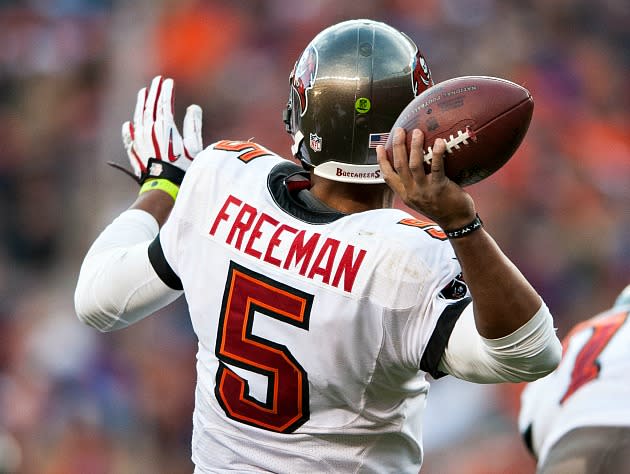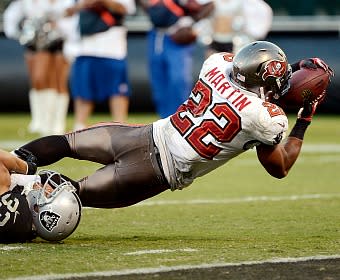Juggernaut Index, No. 10: The Tampa Bay Buccaneers

So ... Josh Freeman. He's awesome. And then he's horrible. He's horrisome. Hawesible? Awerrisible?
I'm not sure what to call him, really.
When Freeman is unhurried and locked-in, he's tremendous. During a five-game stretch last season between Weeks 6 and 10, he threw 13 touchdown passes and just one interception, leading his team to four wins. Freeman's passer-rating in each of those games was well over 100.0.
But his play deteriorated in the final weeks, then fell off a cliff in mid-December. Tampa Bay closed the season with losses in five of its last six games. In Week 15, in what should have been a friendly match-up against the Saints, Freeman was an absolute mess, a fantasy plague. He threw four interceptions, lost a fumble, averaged 5.9 yards per attempt and finished with a passer-rating of 37.5. His team was destroyed, 41-0. On the Bucs' final drive against New Orleans, Freeman was actually replaced by Dan Orlovsky — yup, this Dan Orlovsky — which has to be rock-bottom for any professional quarterback.
Freeman enters 2013 in the final year of his rookie deal, still trying to convince his employer that he's worth a substantial long-term investment. His offensive line should be very good, now that guards Davin Joseph and Carl Nicks have recovered from injuries. His starting receivers are among the NFL's best. His running back is a do-it-all player coming off a 49-catch season. Without question, Freeman finds himself in an enviable situation. He passed for a franchise-record 4065 yards and 27 TDs last year, so it's not as if he's never made a play.
Still, the giveaways continue to pile up for Freeman. He's thrown 39 interceptions over the past two seasons, plus he's put the ball on the ground 19 times, losing seven fumbles. Accuracy is another worry, as he completed just 54.8 percent of his passes last year. When pressured, Freeman was notably bad — his completion percentage was 41.4 in such situations, per Pro Football Focus, and he tossed nine picks. For comparison's sake, Freeman's under-pressure completion rate placed him just behind Rivers (43.2) and Weeden (41.8), just ahead of Sanchez (41.1) and Ponder (40.6).
Freeman isn't going to lose his starting job to third-round rookie Mike Glennon any time soon, but the team is clearly looking for progress. Tampa's offense is entering its second season under coordinator Mike Sullivan — Eli Manning's former position coach — and continuity is generally a good thing in the NFL.
"[Josh] is way more comfortable this year with the language," Vincent Jackson said back in June. "You can see it in his confidence, the way he's directing the field."
"The big problem last year," said Mike Williams, "was we couldn't get on the same page, knowing when to break our routes off."
This season, miscommunication won't really be an acceptable excuse. Again, Freeman should benefit from system stability, improved protection, excellent receivers and a terrific ground game. If he can't deliver a better season in this environment, then maybe it's never gonna happen.
At Freeman's average draft position (126.2), there's basically no risk attached. He's going undrafted in a majority of Yahoo! leagues, a reflection of the depth of talent at QB (and also, perhaps, a reflection of everyone's frustration with Freeman). Earlier this week, I landed him at $4 in an auction, in a two-quarterback league. That price seemed ridiculously low, considering last year's numbers and this year's setup.

Jackson and Williams both finished as top-20 fantasy receivers last season, combining for 135 catches, 2380 yards and 17 touchdowns. These guys have ideal size, and Jackson remains one of the NFL's elite deep threats. He led the league in yards-per-catch last year (19.2) while establishing new career highs in receptions (72) and yards (1384). Williams is an oddly under-appreciated WR2; his current ADP (93.2) doesn't adequately reflect his 2012 production (63-996-9).
Fantasy owners don't need to look beyond the first two names in this receiving hierarchy, unless you're playing in a monstrously deep format. Kevin Ogletree and Tiquan Underwood are battling for third-receiver status; Luke Stocker and Tom Crabtree top the depth chart at tight end. Most of you guys should just ignore every name in this paragraph.

Doug Martin was simply a beast as a rookie, gaining 1926 scrimmage yards on 368 touches, crossing the goal line 12 times, fumbling just once. He's a consensus top-5 pick entering his second season, a strong play in both PPR and standard formats. Martin won't share the backfield workload with anyone in 2013 — Peyton Hillis is already dinged, not that he was ever a threat — and he'll obviously benefit from Tampa's improved O-line. If you want to select Martin second overall on draft day, I get it. He isn't quite that high on my board, but he's in the neighborhood.
True, Martin scored nearly 20 percent of his total fantasy points in a single game last season — the 251-yard shaming of the Raiders — but the man also topped 100 scrimmage yards 10 times. He was a remarkably consistent fantasy scorer, who happened to also deliver an all-time single-game performance along the way. He's reliably great; draft and enjoy. If you're feeling handcuffy, Brian Leonard appears to have an edge over Hillis and Mike James.
Tampa Bay's defense ranked dead-last against the pass last season (297.4 YPG), yet first against the run (82.5 YPG, 3.5 YPC). So yeah, they were a bit lopsided. DE Adrian Clayborn is returning from a season lost to injury, which clearly helps, plus the Bucs acquired CB Darrelle Revis back in April. There's little doubt this D will improve, though the division remains a minefield. IDP owners should jump on second-year linebacker Lavonte David, a tackle-for-loss machine. This D/ST should be a solid play in Week 1 (at NYJ), but you'll kick 'em to the curb before match-ups with the Saints and Pats in Weeks 2 and 3.
2012 team stats: 24.3 points per game (13), 248.9 passing yards per game (10), 114.8 rushing yards per game (15)
Previous Juggernauts: 32. NY Jets, 31. Oakland, 30. Jacksonville, 29. Buffalo, 28. Cleveland, 27. Tennessee, 26. San Diego, 25. Miami, 24. St. Louis, 23. Pittsburgh, 22. Arizona, 21. Minnesota, 20. Kansas City, 19. Chicago, 18. Baltimore, 17. Philadelphia, 16. Indianapolis, 15. Carolina, 14. Cincinnati, 13. NY Giants, 12. Detroit, 11. New England
_

